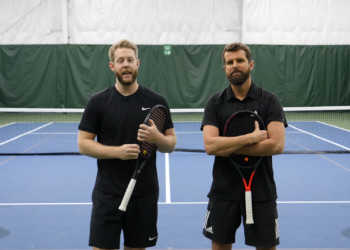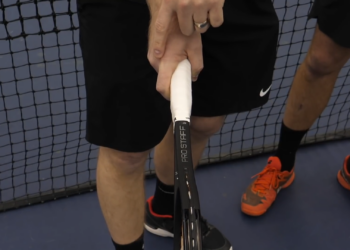If you’ve ever watched a tennis match swing wildly in momentum, or felt one slip away in your own hands, you already know how important the mind is in this sport.
I’m here to tell you something the traditional tennis world doesn’t talk about enough: your brain might be the most powerful tool in your bag.
Mental toughness in tennis is your ability to stay focused, confident, and calm under pressure. Not just when you’re winning. Especially when you’re not.
You don’t have to be the strongest player or have the prettiest strokes to win matches. What you do need is the ability to refocus after every point, bounce back from mistakes, and execute your game plan even when your heart’s racing at 150 beats per minute.
That’s mental toughness. And just like your footwork or your serve, it’s a skill you can train.
It’s about building composure, developing awareness, and playing with intention instead of reaction. That’s the real edge, especially when the scoreboard gets tight.
How Mental Toughness Shows Up on Court
If there’s one thing I’ve learned coaching thousands of players across the country, it’s that the scoreboard rarely tells the full story.
Two players can hit the same number of winners, have similar strokes, and even run the same drills… but one walks off with the win.
Why? Because when the pressure hits, only one of them has trained their mind.
The Big Points Are All That Matter
You can win a tennis match by winning just 51% of the points.
That means the match doesn’t go to the player who dominates, it goes to the one who stays mentally present in the moments that matter most.
I’ve seen plenty of players with textbook technique who fold like lawn chairs in a third-set tiebreak. And I’ve watched scrappy grinders, with nothing but heart and mental steel, pull off wins they had no business winning on paper.
That’s what mental toughness does, it bridges the gap between talent and results.
Clutch players aren’t necessarily better players. They’re the ones who don’t blink at break point. They step up when the game gets loud.
Common Scenarios Where Players Break Down
Let’s get real, every player has been here:
- Double faulting under pressure: You’re tossing the ball and thinking instead of playing. That voice in your head says, “Don’t miss,” and… you miss.
- Losing to “pushers” with worse strokes: You’ve got the better technique, but they’ve got the better nerves. They’re not rattled, you are.
- Playing amazing, then freezing at match point: You’re two points away from the win, then suddenly your legs feel like concrete. This is where mental training makes or breaks you.
These are symptoms of untrained mental habits.
Signs You Need Mental Work
You don’t have to be a pro to benefit from mental toughness training. If any of these sound familiar, it’s time to shift your focus:
- You keep losing close matches: You’re right there, but something keeps slipping. That “something” is your mindset at crunch time.
- You worry about spectators: Instead of focusing on your opponent, you’re playing to avoid embarrassment. That distraction costs you.
- You spiral after one mistake: A missed volley turns into a lost set, because you didn’t reset mentally.
Look, this is normal. It happens to weekend warriors and ATP hopefuls alike.
The difference is, mentally tough players know how to stop the spiral before it starts. They’ve trained for these moments, not just physically, but mentally.
The Four Room Method: A Pro-Level Mental Reset Between Points
If you’ve ever felt your brain spinning after a missed shot or found yourself overthinking on break point, this is where your match can change, not with your forehand, but with your focus. We’ve developed a simple but powerful framework we teach to players of all levels:
The Four Room Method.
This is a mental map designed to reset your mindset between points, keeping you sharp, composed, and in control when it matters most. Pay attention, because this is something used at the highest levels of the game. I wish I was taught this when I played competitively.
Let’s walk through the rooms.
Room 1: The Bathroom (Flush It)
First stop? You’ve got to flush the last point.
Whether you just hit an ace or dumped an overhead into the net, that point is gone and so should your attachment to it be.
The mentally tough player doesn’t dwell. They delete. They understand every point is worth exactly one point. Not more. Not less. Letting go of the past is the first step in dominating the present.
Room 2: The Sunroom (Relax & Breathe)
Now that you’ve flushed the last point, step into the sunroom. This is where you take a deep breath, literally.
- Inhale through your nose.
- Exhale through your mouth.
- Pull your belly button toward your spine.
This diaphragmatic breathing technique is used by pros on the ATP and WTA tours to calm the nervous system and reset between rallies. You’re not just catching your breath, you’re telling your brain it’s safe to focus again.
Room 3: The Office (Make a Plan)
Now you’re thinking clearly, it’s time to work.
Welcome to the Office.
This is where you become strategic. What’s your serve location? How are you responding to a wide return? Where do you want the point to end?
Our PlayYourCourt coaches sometimes joke about putting on your “mental suit” here, channel your inner CEO. No emotions. Just smart, focused decisions.
Room 4: The Hallway (Energize and Show Confidence)
Last stop before the point begins: the Hallway.
Here’s where you own the moment. Straighten up. Shoulders back. Racquet in hand like it’s an extension of your body. Walk to the line like you belong there, because you do.
Even if you’re nervous inside, your body language tells a different story. This posture projects confidence to your opponent and reinforces it in you.
Use rituals: bounce the ball the same way, check your strings, make direct eye contact with the court ahead. These behaviors signal to your brain: “I’m ready.”
🧠 Pro Tip: You can walk through all four rooms in 10 seconds or less.
It doesn’t take time, it takes intention. And the more you practice, the more natural it becomes.
Whether you’re playing a league match or a rec set on Saturday morning, The Four Room Method is your fast-track to mental control.
It eliminates overthinking, calms anxiety, and keeps you focused on what actually wins matches: the point you’re playing right now.
Practical Techniques to Build Mental Strength Daily
Mental toughness is something you build, brick by brick, in the days leading up. The same way you drill your backhand or work on your conditioning, you can train your brain. And you don’t need a sports psychologist to get started.
Use Mental Rituals to Anchor Focus
Ever notice how Rafa bounces the ball like a metronome before every serve? That’s not superstition, it’s science.
Simple rituals like bouncing the ball 3 times, checking your strings, or adjusting your grip before each point give your brain something to latch onto. These small, consistent behaviors act as mental anchors that pull you into the present moment and reduce match stress.
It’s about rhythm. Routine. Control.
If the chaos of a match starts creeping in, your ritual snaps you back to center.
Pick one. Stick with it. Let it be your reset button.
Train with Pressure Drills
If you only practice in low-stress environments, you’re not preparing for real matches, you’re preparing for practice. Big difference.
Pressure drills simulate what you’ll face in competition:
- Play games with only one serve to train focus under risk.
- Use “sudden death” points at deuce to mimic tiebreak tension.
- Set up practice scenarios where a single point decides the winner.
This kind of practice sharpens your composure. It builds the mental calluses you’ll need when you’re serving at 4–5, 30–40 in a real match.
Breathwork, Not Brute Force
Most players try to muscle through nerves. That’s like pouring gas on a fire.
Your breath is the real power move.
- Slow breath calms the nervous system and helps you feel grounded. Perfect for high-pressure moments.
- Fast, sharp breath energizes you. Great if you’re feeling flat and need a spark.
Breathing techniques are foundational in our coaching system for a reason, they’re fast, free, and incredibly effective.
Whether you’re prepping for a serve or coming off a bad point, how you breathe can literally flip your brain into match mode.
Positive Self-Talk Beats Talent
Here’s a truth bomb: the voice in your head is coaching you all match long.
Is it helping? Or hurting?
Negative self-talk – “Don’t miss,” “I suck,” “Why do I always do this?” – erodes confidence point by point. But you can rewrite that narrative.
Create custom affirmations that support the player you want to be:
- “I play fearless at 30-all.”
- “I trust my strokes.”
- “I am calm under pressure.”
Say them before matches. Repeat them after errors. Whisper them between points if you need to.
We call these magic pills. They’re small mental hacks that make a huge difference under fire. And just like footwork, you get better with repetition.
Building mental toughness isn’t complicated. It’s just rarely trained.
Start with rituals. Layer in breathwork. Add pressure drills and self-talk.
Do that daily, and you’ll be a different player a month from now, not just more consistent, but mentally bulletproof.
The Science Behind Staying in the Moment
If you’ve ever lost a match and walked off court thinking, “What just happened?”, don’t worry.
Most players don’t lose because they’re less skilled, they lose because their focus wandered at the wrong time.
The fix? Learning to stay in the moment. It’s the #1 skill that separates elite competitors from talented underachievers and it’s absolutely trainable.
Time-Traveling Minds Sabotage Matches
Let’s call it what it is: choking. And it has nothing to do with your swing mechanics.
Choking is mental time travel. It’s your brain hitting fast-forward to match point or rewind to that easy sitter you dumped in the net. You’re no longer playing tennis… you’re watching a highlight reel in your head.
This is when your legs get heavy, your timing goes, and your confidence crumbles. Not because you forgot how to hit, but because you left the moment.
Mental toughness keeps you anchored. It brings your attention back to the one place you can control: right now.
Mindfulness & Visualization Work
This is why some of the world’s best players train their minds like they train their serves.
- Mindfulness meditation teaches your brain to observe without judgment and come back to the present.
- Visualization lets you mentally rehearse points, improving confidence and execution even before you step on court.
Your Body Language Affects Your Brain
Think posture doesn’t matter? Think again.
Your body literally talks to your brain.
- When your shoulders slump, your brain hears: “We’re losing. Give up.”
- When your chin drops, your body says: “We don’t belong here.”
- But when your eyes stay up and your feet stay active, your body signals confidence, even if you’re nervous.
This is why the Hallway is the final room in our Four Room Method. That walk to the baseline? That’s your chance to become the player you want to be, whether you feel it yet or not.
We train our athletes to walk tall, move with energy, and look the part, because the science backs it: your brain believes what your body says.
The bottom line? If you want to play better tennis, you’ve got to be present. Every point. Every breath. Every step.
Questions Players Ask (and the Real Answers)
When we talk about tennis mental toughness, most players nod their heads and say, “Yeah, I need that.”
But then the real-life questions start rolling in. The kind of questions I hear every week, from juniors, club players, and even tournament grinders.
So let’s tackle them head-on with real answers, straight from the PlayYourCourt court-side notebook.
What if I can’t stop thinking about a bad shot?
Welcome to the human condition. We all do this. But here’s your fix: flush it.
That’s what Room 1 in the Four Room Method is for.
You step into the “Bathroom,” mentally speaking, and you let that last point go, good or bad. Replaying it doesn’t change it. It only distracts you from what matters most: the next point.
Every point is a fresh slate. The scoreboard may not reset, but your focus can.
How do I stay calm before serving in a tiebreak?
Go to your Sunroom, literally. Close your eyes for a second if you have to. Inhale deep through your nose, exhale long through your mouth, and let your belly fall inward.
This isn’t fluff. Diaphragmatic breathing physically calms your nervous system. You’re slowing your heart rate, calming your muscles, and most importantly, reclaiming control over your thoughts.
Now visualize your serve. Not winning the point, but the motion, the rhythm, the execution. That’s where calm lives.
What if I don’t have time for all four rooms?
You do. This method was built for tennis players who only have 20 seconds between points.
The Four Room Method is a rhythm, not a ritual. Once you get used to it, you can cycle through Bathroom → Sunroom → Office → Hallway in under 10 seconds. It becomes your autopilot. Your in-match mental playlist.
Practice it in drills. Use it during casual hits. By match time, it’ll feel natural—and powerful.
Whether you’re a tournament vet or you just picked up a racquet last summer, mental toughness isn’t reserved for elite players.
It’s built through simple tools, practiced often, and applied consistently. These questions come from real players and the answers we use every day at PlayYourCourt.
How to Start Training Your Tennis Mental Toughness Today
You don’t build mental toughness overnight. You build it the same way you build a great forehand, one deliberate rep at a time.
The good news? You don’t need a sports psych degree, fancy tech, or even extra hours in the day. You just need a plan and a little consistency.
Here’s how to get started right now:
Step 1: Pick 1 Ritual
Start small. One ritual. One habit. One anchor.
Bounce the ball twice before every serve. Adjust your strings after every point. Tug your sleeve, touch your heart, tap your racquet. Doesn’t matter what it is, it matters that it’s yours.
Rituals are how you tell your brain, “We’ve been here. We know what to do.”
Step 2: Use the Four Room Technique in Your Next Match
Even if you’re only playing rec doubles or drilling with a buddy, walk through the Four Room Method:
- Bathroom – Flush the last point.
- Sunroom – Take a breath.
- Office – Make a plan.
- Hallway – Walk like you’ve already won.
Ten seconds. That’s all it takes. The more you use it, the more instinctive and effective it becomes.
Step 3: Practice Breathwork Once a Day
This one’s easy. One minute. That’s it.
Inhale for 4 seconds. Hold for 4. Exhale for 6.
Repeat a few times during your warm-up, before bed, or even at your desk.
You’re training your nervous system to stay calm under pressure, exactly what you’ll need at 5–5 in a tiebreak.
Step 4: Journal Wins and Setbacks
Skip the match stats for a second and ask yourself:
- Where did I stay focused?
- When did I spiral?
- What reset actually worked for me?
You’re not just documenting your tennis, you’re tracking your mindset. This is how you spot patterns and start making progress you can feel.
Mental Toughness Is a Trainable Edge
Everyone wants to improve their serve, strokes, and strategy. But if your mind isn’t on your side, none of that matters.
Mental toughness isn’t a mystery. It’s a skill.
It’s built through rituals, breathwork, focus, and consistency. It’s what helps you finish strong, not fade under pressure.
💡 And that’s exactly what we train at PlayYourCourt.
We’re not just about finding you a hitting partner (though we do that, too). We’re your all-in-one tennis improvement platform, built for real players who want real results.
With video tips, coach-led challenges, mental toughness frameworks, and a community that trains like you play, PlayYourCourt becomes your mental gym as much as your physical one.
You’ll not only improve faster, you’ll stick with the game longer, with more confidence and more wins to show for it.
👉 Ready to build the mindset that wins matches? Explore our Membership and get 7 days free.
Train with intention. Compete with confidence. Play your best tennis, mentally and physically.



